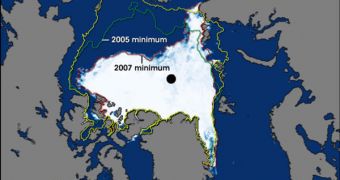Previous studies have predicted that the global warming trend our planet is experiencing is so alert that we could see the Arctic region being stripped bear of its ice sheets within a few decades. But now, leading polar expert Warwick Vincent, who is the director of the Center for Northern Studies at Laval University, in Quebec, Canada, says that this could happen as early as 2013, if the current levels of ice loss continue into the following 4 years.
On Thursday, he said that the present situation in the field seems to unfortunately follow the worst-case scenario, and that the increasing global temperatures could melt the entire stretches of Arctic ice in a much shorter time span than first anticipated. “2013 is starting to look as though it is a lot more reasonable as a prediction. But each year we've been wrong – each year we're finding that it's a little bit faster than expected,” the scientist told Reuters.
“I was astounded as to how fast the changes are taking place. The extent of open water is something that we haven't experienced in the 10 years that I've been working up there. We're losing, irreversibly, major features of the Canadian ice scape and that suggests that these more pessimistic models are really much closer to reality,” he recently shared with the Canadian Parliament, during a hearing.
“Some of this is unstoppable. We're in a train of events at the moment where there are changes taking place that we are unable to reverse, the loss of these ice shelves, for example. But what we can do is slow down this process and we have to slow down this process because we need to buy more time. We simply don't have the technologies as a civilization to deal with this level of instability that is ahead of us,” he added.
Throughout the Arctic, the researcher noted a severe decrease in the amounts of ice in the Canadian north. He underlined that temperatures in the Ward Hunt region reached temperatures as high as 20 degrees Celsius (68 degrees Fahrenheit), as opposed to the regular 5 degrees registered in other years. In addition, he mentioned, the five ice sheets that lay on Canada's Ellesmere Island, in the far north, had dropped in volume by 23 percent in 2008. These ice sheets are more than 4,000 years old.

 14 DAY TRIAL //
14 DAY TRIAL //